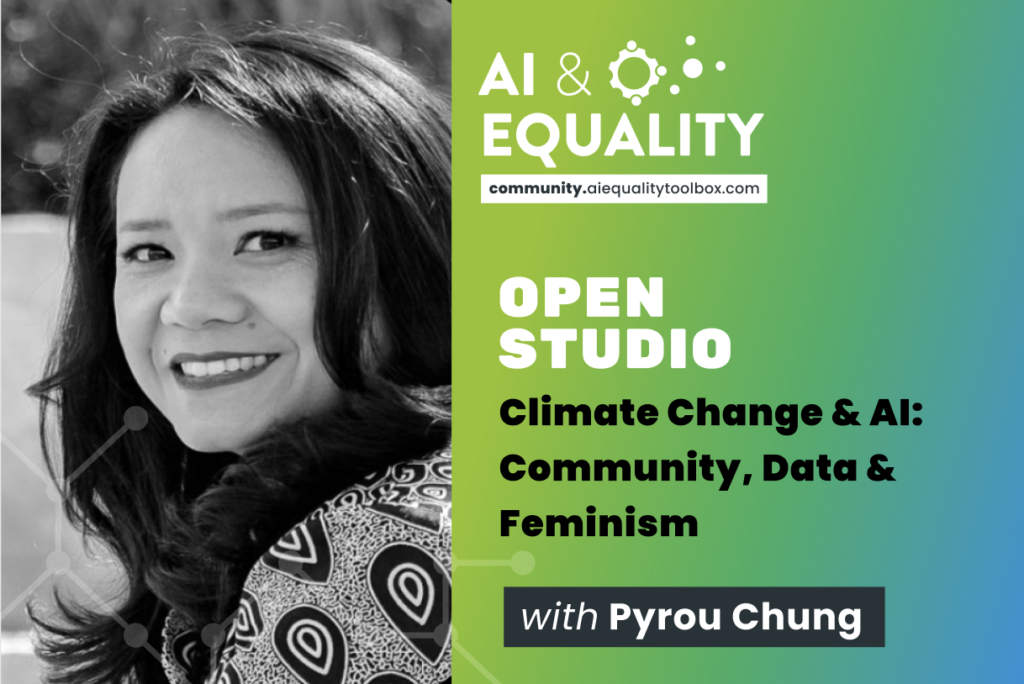In her Open Studio on AI & Climate: Community, Data & Feminism, Pyrou Chung discussed the challenges and principles of integrating feminist and Indigenous perspectives in technology and data science. She emphasized the need for technologies that respect the rights of local communities, particularly in the context of environmental justice. She approaches intersectionality by emphasizing the need for continuous, inclusive approaches in Asia that ground technological advancements and tools in meaningful, collaborative dialogue with Indigenous communities, women leaders, and marginalized groups, ensuring that their knowledge, needs, and cultural contexts are not only acknowledged but actively integrated into the design and governance of these technologies.
Pyrou underscores the importance of centering feminist and Indigenous perspectives to create systems that are both equitable and culturally appropriate, allowing communities to retain agency over their lands, resources, and data. Her work focuses on dismantling colonial and patriarchal structures in technology, advocating for systems that are decolonized, localized, and co-designed with the communities most affected by these technologies. In her talk, she focused on elaborating on the following:
Feminist and Indigenous Principles: An inclusive approach in technology and data governance must be rooted in feminist principles such as equity, care, and empowerment. These principles should guide technological design, especially when it involves Indigenous communities. Communities’ land rights, cultural heritage, and self-determination must be respected in any tech-based solutions, especially in environmental data work.
Data as a Human Right: Data is not just a technical resource, but a fundamental human right—especially for Indigenous people. The right to control and manage data, particularly related to land and cultural knowledge, should be seen as interconnected with land rights. Tech systems that extract and use Indigenous knowledge without benefiting the communities are harmful and perpetuate historical injustices and epistemicides..
Challenges in Technology Design: Current technological systems often fail to reflect Indigenous governance structures and collective rights. The centralization of technology development, often in English, creates significant barriers for non-English-speaking Indigenous communities. Technology should empower communities to manage their data and resources, not impose externally designed systems that don’t fit their needs.
Technology and Environmental Justice: On the intersection of technology and environmental justice, tech should not simply be about profit or tracking systems but should focus on addressing environmental issues in a way that empowers marginalized communities. We must critique and speak against the dominant narrative in carbon financing, where corporations buy credits to offset pollution while local communities are excluded from decision-making or benefit-sharing.
Case Study of Mangrove Communities: In Southern Thailand local communities were excluded from carbon credit initiatives involving mangrove forests. The government had granted concessions to corporations without informing or consulting the communities, depriving them of both land rights and potential benefits from carbon credits. Pyrou argues that the solution would be for communities to govern these resources and manage carbon credits themselves, using their local knowledge and establishing a more equitable, community-driven approach.
Pyrou’s Advice for Young Data Scientists:
- Approach environmental justice through tech with a human rights lens.
- Recognize that the data you work with may be tied to the land, culture, and self-determination of communities, particularly Indigenous peoples.
- Always ask: who owns the data? Who benefits from it? Ensure that benefits flow back to the communities whose knowledge and resources are being used.
- Design technologies that are inclusive and accessible, particularly for those who are often excluded from digital systems.
- Respect local knowledge and practices in your work, and avoid imposing external metrics or frameworks that may not be appropriate for the communities you’re working with.
- Engage communities in the design, governance, and control of the technologies you create. Ensure that they have agency over their own data and resources.
- Understand the political and economic dynamics at play when working with marginalized communities, particularly when dealing with projects like carbon financing.
In building technology that is rights-respecting and community-driven, we must not and not allow the continued exploitation of marginalized communities through extractive systems. This is an urgent issue in today’s climate crisis, a call for data scientists to be accountable and mindful in their work.
About Pyrou Chung
Based in Thailand, Pyrou Chung directs the East West Management Institute Programs on natural resources, land, and data initiatives in Southeast Asia under the Open Development Initiative. Pyrou has over 20 years of experience in the development sector across Asia, Africa and Australia.
As an ecologist and sustainable development expert, her work has been focused on the nexus between environmental governance, conservation and human rights, with an emphasis on digital technologies and artificial intelligence affecting environmental data justice issues.
Through partnerships and participatory action research this work explores these intersections in order for Indigenous Peoples and environmental defenders to seek self-determination rights over lands and territories.


